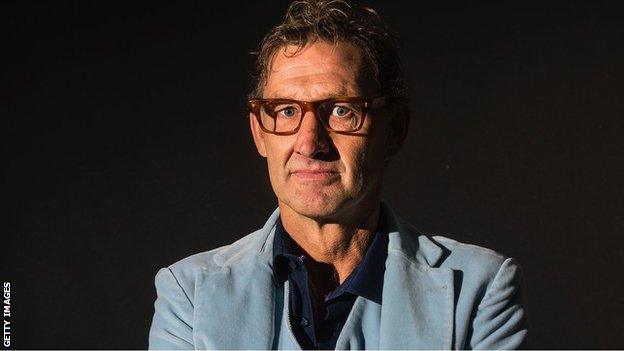Gambling addiction rises among professional sportspeople, says Sporting Chance
- Published

Former England and Arsenal captain Tony Adams set up the Sporting Chance clinic 20 years ago
Gambling addiction has become the biggest issue among professional sportspeople treated by the Sporting Chance clinic, says founder Tony Adams.
The charity says almost half of its clients treated for addiction are related to gambling.
Of these, 60% are current professionals with cases eclipsing those treated for alcohol or drugs addiction.
“Gambling has been an issue even stretching back to my playing days,” said former Arsenal captain Adams.
“But it seems to be the biggest issue now, more than alcohol.”
Sporting Chance chief executive Colin Bland says the relationship between sport and gambling has reached a “pivotal point” and has called for “meaningful reform in order to protect against further avoidable harm”.
He added: “It is apparent that many people within professional sport are uncomfortable with the level at which the gambling industry has managed to embed itself in the fabric of their beloved sports.”
Sporting Chance was originally set up for footballers, but now offers mental health services for current and former professional sportspeople through treatment and education.
The rise in its gambling addiction cases comes at a time when betting advertising is commonplace in professional sport.
In football, 75% of Premier League teams have betting sponsors or partners, with that figure rising to 87% in the Championship.
Both the Premier League and the English Football League (EFL), which is sponsored by Sky Bet, say their clubs comply with regulations.
In an open letter,, external Bland said there had also been an increase in requests from professionals for more education on what it calls a “serious public health issue”.
He also said that talks have begun with sports bodies about their relationship with the industry, citing “concerns about the amount of gambling exposure our clients are faced with when returning to their professional environment both while receiving and after completing treatment”.
Outlining a number of proposals, Bland says that responsible gambling campaigns should help fund welfare treatment and education in each sport and that those services should be independent of the gambling industry.
While recognising the financial problems associated with the coronavirus pandemic, the charity also recommends that “each sport should plan to reduce and replace gambling industry associations in a sensible and manageable way”.
He added: “While we can successfully treat individuals, it is also important to try to prevent and protect against unnecessary harm.
“While Sporting Chance is not anti-gambling, we do believe that change is needed.”
A spokesperson for the Betting and Gaming Council (BGC) said: "Betting advertising helps to provide sports such as football with funding, while enabling TV channels to broadcast more sport than would otherwise be possible. It also plays a vital role in differentiating legally licensed operators from those in the black market, who do not have the safety protections in place that our members do.
"BGC members also work with various organisations across a wide range of sports to provide safer gambling educational resources for players and staff, and promote safer gambling more widely for sports participants, including fans.
"The BGC is determined to drive up standards across the betting and gaming industry and looks forward to working with the government on its forthcoming gambling review to do just that."

Black History Month: Four must watch films
